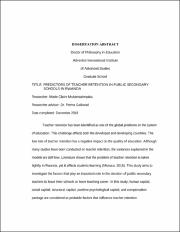Predictors of teacher retention in public secondary schools in Rwanda
Abstract
Teacher retention has been identified as one of the global problems in the system of education. This challenge affects both the developed and developing countries. The low rate of teacher retention has a negative impact on the quality of education. Although many studies have been conducted on teacher retention, the variances explained in the models are still low. Literature shows that the problem of teacher retention is taken lightly in Rwanda, yet it affects students learning (Monaco, 2016). This study aims to investigate the factors that play an important role in the decision of public secondary teachers to leave their schools or leave teaching career. In this study, human capital, social capital, structural capital, positive psychological capital, and compensation package are considered as probable factors that influence teacher retention.
This correlational study employed an adapted questionnaire as data collection tool. This research instrument was distributed to 528 teachers in public secondary schools located in two districts of the capital city of Rwanda. Among the questionnaires distributed, 409 were returned and coded in Statistical Package for the Social Sciences. After data cleaning, 393 cases were qualified for data analysis. Independent t-test, analysis of variances, correlation, and hierarchical multiple regression were the statistical analysis used to answer the research questions.
The findings indicate that the majority of public secondary school teachers in the capital city of Rwanda are male. These teachers are between 31 and 40 years old and they have 0 to 5 years of working experience in teaching. This study also revealed that there is no significant difference in human capital, social capital, structural capital, positive psychological capital, compensation package, and teacher retention among the demographic variables (gender, age, educational level, and years of experience). The significant difference has been identified in human capital between male and female. Further, teachers between 41 years old and above have high perceptions in compensation package than others.
This study also found out that there is a positive relationship between social capital, structural capital, positive psychological capital, and compensation package and teacher retention. However, the final model shows that human capital and teacher retention correlate negatively. Regression coefficients show that compensation package, positive psychological capital, social capital, and human capital are the predictors of teacher retention. The overall predictive model explains 52.7% of variances in teacher retention after removing the effect of years of experience. Furthermore, this study shows
that structural capital does not predict teacher retention. Finally, the researcher provides recommendations to different educational stakeholders and future researchers in the area of teacher retention.


